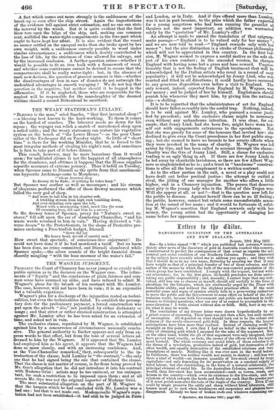THE WAGNER JUDGMENT.
PROBABLY the Court of Chancery has never jumped so evenly with public opinion as in the decision on the Wagner case. The refine- ments of "Equity" and the conclusions of plain fairness and com- mon sense have summed up alike, and have refused to admit M. Wagner's pleas for the breach of his contract with Mr. Lumley. The case, however, will not have been in vain ; it is an expensive but a valuable experience.
Wagner's plea for a discharge of the injunction rested on techni- oalities, but even the technicalities failed. To establish the peremp- tory date for the preliminary payment, a forced construction was put upon the adverb "des," not justified ,by either dictionary or usage ; and that strict or rather strained construction is attempted against Mr. Lumley after he has been asked for an extension of time, and asked not in vain.
The exclusive clause, repudiated by M. Wagner, is established
against him by a concurrence of circumstances unusually conclu- sive. The general authority to Becher appears not only from ex- press words to that effect, but from the tone of several letters ad- dressed to him by the Wagners. If it appeared that Mr. Lumley had employed him as his agent, it appears that the Wagners had done so more closely, and with an increasing confidence. And, as the Vice-Chancellor remarked,: they, subsequently to the in- troduction of the clause, held Lumley to "the eontracst,"—the only one that he had signed being the one that contained the clause. That the clause is not matter of course, is far from being proved by Mr- eye's allegation that he did not introduce it into his contract with Madame Grisi : artists may be too eminent, or too unimpor- tant, for such a restriction to be imposed upon them ; and at all events Mr. (lye was not the original importer of Madame Grisi. The most substantial allegation on the part of M. Wagner is, that the bargain which he had concluded with Mr. Lumley was a bad one : but that is not made out. Mademoiselle Wagner's repu- tation had not been established—it had still to be judged in Paris and London, or in Italy. And if (lye offered more than Lumley was it nada part because, to the price which the father expected for a young songstress who had been running the gauntlet at theatres not the most important, an addition was warranted solely by the "quotation" of Mr. Lumley,r's offer? An attempt is made to amend the translation of that epigram_ matio passage—" England is to be valued only for her money"; and we are now told to read—" England rewards only with her money" : but the nice distinction is a stroke of German philosophy which will not be appreciated in this country. In the first ver- sion, M. Wagner seemed to express a sordid motive as the sole ob- ject of his own conduct ; in the amended version, he charges England with having none but a gross and base reward. Unques- tionably that is not the feeling of English treatment that will be acknowledged by the Italian artists who revel in a round of easy popularity ; it will not be acknowledged by Jenny Lind, who was courted and feted in all directions ; it could hardly have occurred to any generous disposition even before a visit to England. The only reward, indeed, expected from England by M. Wagner, was her money ; and he judged of her by himself. Englishmen should punish him whenever they meet him, by giving him the national coin—a shilling.
It is to be regretted that the administrators of art for England should have fallen so readily into the sordid trap. Nothing, indeed, is to be said against Mr. Lumley, who pursued a course justi- fied by precedent; and the exclusive clause might be necessary even without any unhandsome intention. It was clear, for ex- ample, that Jenny Lind, had she been free, might have worn her- self out with engagements extraneous to the operahouse. Not that she was greedy for some of the honours that invited her : she declined to give even the Court precedence in her first public sing- ing ; but she seemed to have no bounds to her erratic efforts when they were invoked in the name of charity. M. Wagner was led astray by (lye, and has been called to account through the clause : Charity was the (lye of Jenny Lind. Still, a clause for exclusive trading is an ugly thing in art. If there are few Jenny Linda to be led away by charitable lavishness, so there are few...AThert Wag- ners so singleminded as he is ; and a trust in " handsome " construc- tions is after all the best complement to a written contract.
As to the other parties in the suit, a novel or a play could not have dealt out better poetical justice : the attempt to outbid a rival, the jilting of one manager for another who offers a little higher, end in a Chancery injunction. The person that deserves most pity is the young lady who is the Helen of this Trojan war. Will she appear at all, or not ?—that is the question now left for the public to discuss. Against herself there can be no ill feeling; the public, however, cannot but retain some uncomfortable sensa- tion at the sound of her name ; and it would be fortunate if, refut- ing M. Wagner's assertion that England rewards only with her money, the young artist had the opportunity of changing her name before her appearance.


























 Previous page
Previous page